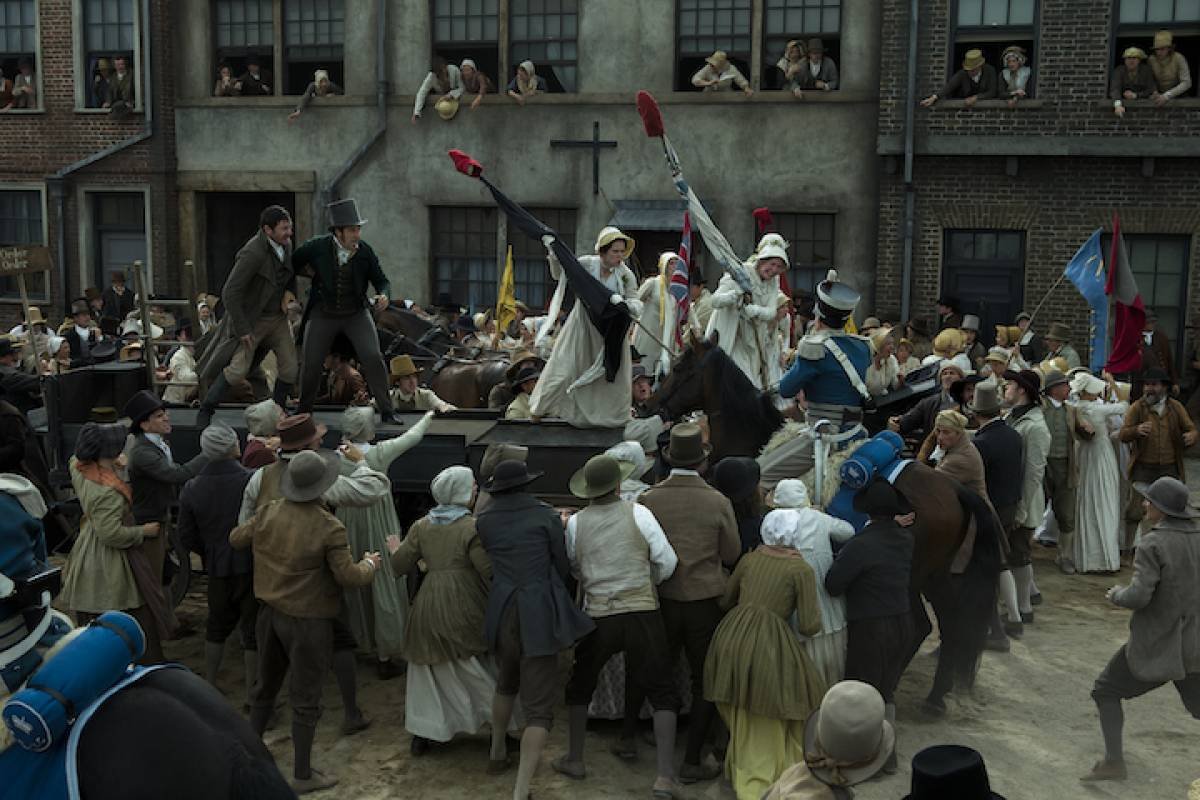Epic cinema clashes with epic rage in Peterloo
Starring Rory Kinnear
Early in Peterloo, we see a string of punishments handed out to the peasantry by sadistic 19th-century magistrates. For one poor soul, the “crime” of taking a rich man’s spare coat ends with death by hanging. The movie seems to suggest that the accused might have received a lighter sentence—14 years exiled to Botany Bay, say—if he hadn’t defiantly presented himself to the heartless judge as a “reformer”.
Radicalism was rife in 1819, with Britain plunged into extreme poverty under a Parliament occupied exclusively by the ruling class. In Mike Leigh’s eye-ravishing history lesson, both sides of the divide speechify their way to the massacre of the title, when troops on horseback slaughtered 18 people and injured hundreds more at an enormous pro-democracy demonstration in Manchester.
Drawn largely from historical records, we hear politicians, lawyers, and church leaders fulminate about the insurrection brewing up north, while falling over themselves to insulate the vile Prince Regent—presented in the film’s most outrageous performance as a powdered, decadent fop with mental issues, courtesy of Game of Thrones' Tim McInnerny.
Meanwhile, a spectrum of working-class dissidents rally among themselves, including the publishers of the Manchester Observer and a bloodthirsty lunatic fringe. Down the middle comes the great “Orator” Henry Hunt, a vainglorious landowner but also a sincere campaigner for universal suffrage (played to the conflicted hilt by Rory Kinnear).
Such vivid characterizations (and ceaselessly wonderful language) aside, Peterloo’s dialectical strategy runs the risk of being dramatically flat. And so we have the very Mike Leigh addition of a chittering northern family scraping by on millwork and barter. (As mother Nellie, hard-nosed Maxine Peake provides another highlight.)
The film begins with son Joseph (David Moorst), lost amid the gore-strewn fields of Waterloo. He makes it home on foot, only to collapse in Nellie’s arms, never to fully regain his mind, spending the rest of the film in his oversized army uniform as a tragicomic symbol squeezed for meaning in Peterloo's final moments. When that climax comes, helped along by a hasty reading of the riot act, ale for the troops, and the provocateuring of Home Office spies, Peterloo explodes into epic cinema—and epic rage.
Anyone missing the smaller pleasures of High Hopes or Life Is Sweet (or even the street-level muck of Naked) might be surprised by what follows: a Mike Leigh action sequence, no less, full of charging horses, rattling sabres, and stomped-to-death babies. After a two-hour build-up, and another 15 or so minutes of heartbreaking carnage, it climaxes with a 360-degree pan worthy of Kubrick in its ghastly, choreographed beauty.
And like Kubrick, Leigh makes unforgettable grotesques of the establishment figures who observe and congratulate themselves on the slaughter. Frankly, this could only be considered extreme in a world that didn't include peasant-hating gargoyles like Boris Johnson or the man colloquially known in the U.K. as Jeremy Cunt, one of whom is set to become the country's next unelected prime minister, serving under a monarchy needed by precisely no one.
Getting that 1819 feeling again? In truth, any artist dropping the gloves at this point in the timeline is simply on the right side of 200 years of history.
Published July, 2019
